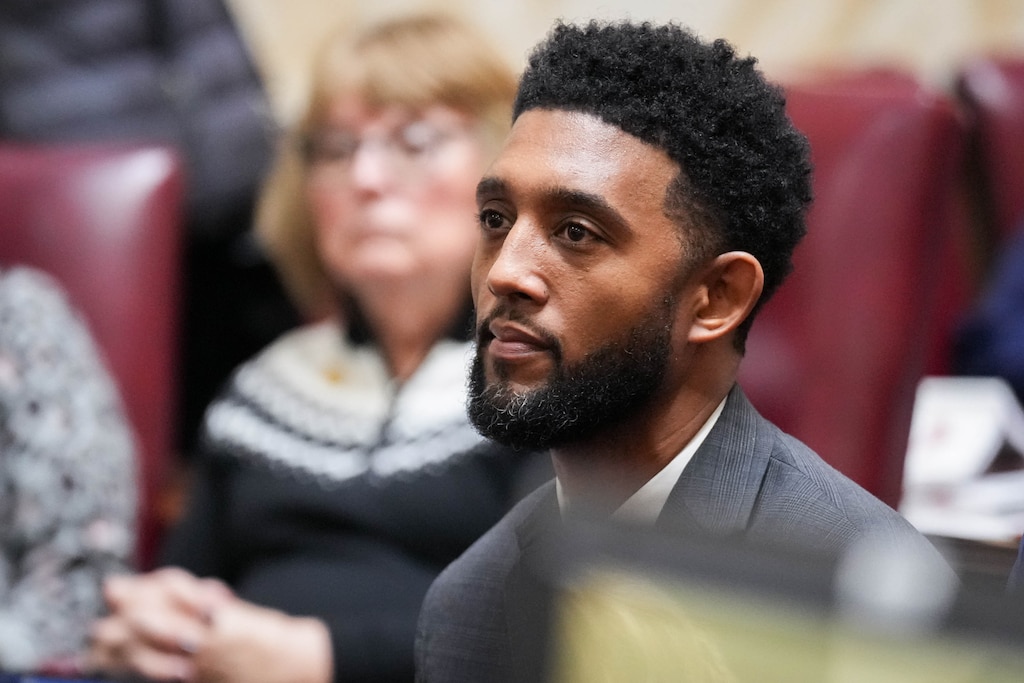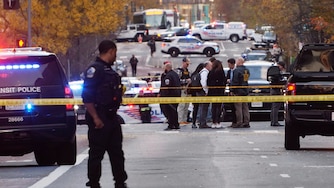Gov. Wes Moore this week declined to say whether he would deploy the Maryland National Guard to the southern border if asked by the federal government, raising questions about whether he would deny such a request from President Donald Trump.
Calling the scenario “speculation,” the Democratic governor said that he’ll ensure the guard and the Maryland State Police agencies are “following very clear guidance about how they are protecting the people of the state.”
“They have very clear missions. They have very clear objectives, and they have very clear orders from their commander in chief,” Moore said, during a news conference on his flagship anti-poverty initiative on Thursday.
Moore’s comments come after reports that the Trump administration directed the Justice Department to investigate state and local officials obstructing federal immigration enforcement and report those who decline, resist or fail to comply with requests from federal authorities. The White House said the U.S. military would send 1,500 additional troops to the border.
Since Trump’s inauguration Monday, the 47th president has issued executive orders declaring a national emergency at the southern border, attempting to redefine birthright citizenship and suspending refugee resettlement agreements. He has also directed the acting secretary of defense to send more troops to the southern border, including members of the National Guard.
What once were campaign promises have inched steps closer to reality. Some are almost certain to face legal challenges.
Moore is among a handful of governors who took action ahead of the presidential transition.

Moore: ‘Maryland is prepared’
In November, Moore’s government signed a short-term contract with a consulting group to help gauge the state’s exposure should key federal policies change.
Moore has said that he’s “not the leader of the resistance” and has reiterated that where interests of Marylanders align with the Trump-Vance administration, he will work with them.
“But making sure that Marylanders are protected is going to be a hallmark of all our interactions,” Moore said in a January interview.
Days after the election, Moore told his cabinet at the State House that Maryland would continue to protect people and their constitutional rights, while growing their economy and restoring their faith in democracy.
“And we need to stand up to all threats that will imperil it.”
Former Gov. Larry Hogan, a Republican, pulled guard troops back from the southern border during Trump’s first term in protest of the president’s family separation policy.
What Maryland’s top officials have said
Attorney General Anthony Brown, along with other states’ attorneys general, issued a statement declaring the federal government cannot commandeer state and local law enforcement, citing the U.S. Constitution and U.S. Supreme Court precedent. But his statement only mentions police, not the National Guard.
“Despite what he may say to the contrary, the President cannot unilaterally re-write the Constitution,” Brown’s statement said.
Brown called Trump’s threats to sic federal prosecutors on local and state officials “vague” and “empty words on paper.”
“But rest assured,” he said. “Our states will not hesitate to respond if these words become illegal actions.”
Moore spokesperson Carter Elliott IV said in a statement that immigration enforcement can only be performed legally by federal officials and that the state does cooperate with Immigration and Customs Enforcement “to surrender violent offenders who are in the country without proper legal status.”
What local officials have said
Similarly, some county officials and Baltimore Mayor Brandon Scott declared plainly their plans not to aid but also to not interfere in Trump’s immigration actions.
“Our approach will not change,” Scott said. “We are watching what the administration actually does, not just what they say.”

Others, like Frederick County Sheriff Chuck Jenkins, said they would continue to fully cooperate and assist with enforcement efforts.
Meanwhile, Congressman Andy Harris, Maryland’s top Republican, said in a statement “that leaders in Maryland should follow Federal immigration law and President Trump’s deportation orders.”
“Maryland state and local officials who obstruct ICE enforcement have been warned.”
Moore’s authority over the state’s military
Moore serves as commander in chief over the Maryland National Guard in most circumstances, unless the president calls them into national service, according to the Maryland constitution and federal law.
Lindsay Cohn, an associate professor at the U.S. Naval War College, explained there are distinct service designations when the guard is under command of a governor or a president.
Under “state active duty” the governor has complete control over the guard. A second designation allows the president to request the service of the guard in other states and a governor can decline these requests. But should the president call up the guard under Title 10, a federal law, the guard is then under the command of the president.
“If the president federalizes the Guard by calling them into federal service, the governors cannot refuse that,” said Cohn, who spoke to The Banner in her personal capacity.
The Maryland National Guard referred all questions about a possible deployment to the National Guard Bureau and the acting secretary of defense.
Should the Guard be deployed on a federal mission, Moore will work state military leaders to ensure sufficient staffing levels for state-related missions, a spokesperson for the Maryland National Guard said in a statement.
On Tuesday, Trump’s acting secretary of defense said he would send more troops to the southern border after meeting with military leaders including the chief of the National Guard Bureau, but did not specify which state’s guard would be used, if any.





Comments
Welcome to The Banner's subscriber-only commenting community. Please review our community guidelines.